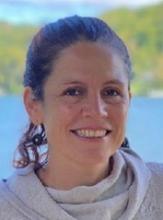
Victoria Acosta-Rodríguez, Ph.D.
National Institute on Aging (NIA)
Dr. Victoria Acosta-Rodríguez was born and raised in San Juan, Argentina. She earned her B.S. and Ph.D. with honors from the National University of Córdoba, Argentina, where she focused on daily rhythms in phospholipid metabolism. She moved to the U.S. for postdoctoral training at UT Southwestern Medical Center. Her postdoctoral research showed that the pro-longevity and anti-inflammatory benefits of caloric restriction in mice are enhanced when feeding times match internal circadian clocks. Her findings challenged the prevailing view that the benefits of this widely studied intervention came solely from lower intake or fasting, instead highlighting time-of-day as a crucial biological factor. In 2024, Dr. Acosta-Rodríguez joined the Translational Gerontology Branch at NIA as an Earl Stadtman tenure-track investigator. She leads the Circadian Biology of Aging Unit, where her team investigates how aging affects circadian clocks and explores interventions to prevent their disruption, aiming to make healthier longevity accessible to all.
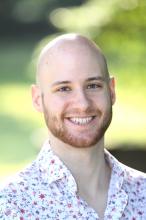
Philip P. Adams, Ph.D.
National Institute of Allergy and Infectious Diseases (NIAID)
Dr. Philip P. Adams was born and raised in West Virginia and western Maryland. He earned a B.S. in biology from West Virginia Wesleyan College and a Ph.D. in biomedical sciences from the University of Central Florida, College of Medicine. Dr. Adams joined the NIH scientific community in 2017 as a post-doctoral fellow in the lab of Dr. Gisela Storz at the Eunice Kennedy Shriver National Institute of Child Health and Human Development (NICHD). He became part of the National Institute of General Medical Sciences (NIGMS) Postdoctoral Research Associate Training (PRAT) program to study RNA biology in bacteria. In 2020, Dr. Adams received an Independent Research Scholar (IRS) Award from NIH, allowing him to form an autonomous NIH research group within NICHD. He then joined the Laboratory of Bacteriology at NIAID as an Earl Stadtman tenure-track investigator. Dr. Adams is a microbiologist whose research is focused on the biology of spirochetes, largely Borrelia burgdorferi—the Lyme disease pathogen, and gene regulation in tick-borne bacterial pathogens.
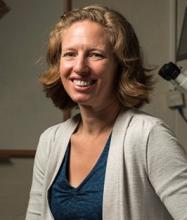
Farran Briggs, Ph.D.
National Eye Institute (NEI)
Dr. Farran Briggs was born in Maine and grew up in the California Bay Area. She earned her B.S. in biology from Dartmouth College and her Ph.D. in biology at the University of California, San Diego. Her postdoctoral training at the University of California, Davis was supported by a Ruth L. Kirschstein National Research Service Award fellowship and a Pathway to Independence Award (K99), both from NEI. She established an independent laboratory at the Geisel School of Medicine at Dartmouth and then became a tenured associate professor in Neuroscience and Brain and Cognitive Sciences at the University of Rochester, before joining NEI as an investigator in 2024. Her research is aimed at understanding how neuronal circuits in the early visual system encode and process visual information in healthy and in disease states and how visual attention modulates these activities.

Leah M. Cook, Ph.D.
National Cancer Institute, Center for Cancer Research (NCI CCR)
Dr. Leah M. Cook is originally from Birmingham, AL. She earned an M.S. in biology and her Ph.D. in molecular & cellular pathology from the University of Alabama at Birmingham and completed an American Cancer Society Postdoctoral Fellowship at the Moffitt Cancer Center. She started her own laboratory as an assistant professor at the University of Nebraska Medical Center, where she was promoted to associate professor with tenure and her research was funded by grants from the American Cancer Society, the Department of Defense, and NCI. Dr. Cook was recruited to the NCI Center for Cancer Research as a Senior Investigator in 2024. Her laboratory in the Cancer Innovation Laboratory is investigating novel tumor-immune cell interactions that contribute to metastatic prostate cancer, particularly involving neutrophils and bone. She is also interested in addressing cancer disparities that impact African American patients, those with the greatest risk of dying from prostate cancer. Her long-term goal is to identify novel immunotherapeutic targets for treating and curing metastatic cancer.

Valerie Darcey, Ph.D.
National Institute of Diabetes and Digestive and Kidney Diseases (NIDDK)
Dr. Valerie Darcey was born and raised on Long Island, New York. She earned her B.A. in the biological basis of behavior from the University of Pennsylvania, her M.S. in human nutrition from Drexel University, and her Ph.D. in neuroscience from Georgetown University with funding from a Ruth L. Kirschstein National Research Service Award (F31) from the National Institute on Alcohol Abuse and Alcoholism. She completed postdoctoral training at NIDDK, where she was awarded a Pathway to Independence Award (K99/R00). She also completed training at the NIH Clinical Center’s Dietetic Internship Program to fulfill requirements for clinical credentials as a registered dietitian. As an NIDDK Stadtman tenure-track investigator, Dr. Darcey’s research will explore how what we eat might influence the function and neurochemistry of brain structures underlying our habits and goal-directed behaviors. Her long-term goal is to develop neuroscience-informed nutritional approaches that enhance long-term adherence to behavioral interventions for clinical conditions (e.g., weight management, substance, and alcohol misuse).
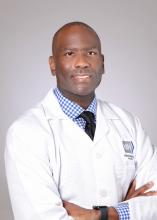
Ifechukwude Ebenuwa, M.D., M.H.Sc.
National Institute of Diabetes and Digestive and Kidney Diseases (NIDDK)
Dr. Ifechukwude Ebenuwa was born in Dallas, Texas, and raised in Nigeria. He received his B.S. from the University of Illinois at Urbana-Champaign, his M.D. from the University of Illinois College of Medicine in Chicago, and his M.H.Sc. from Duke University School of Medicine. Dr. Ebenuwa completed his internal medicine residency at the University of Chicago NorthShore program, followed by an adult endocrinology fellowship at the Inter-Institute Endocrinology Training Program at NIH. He joined NIDDK as a Staff Clinician and is an Assistant Clinical Investigator within the Digestive Diseases Branch at NIDDK. His research focuses on understanding the pathophysiological nutritional changes in chronic diseases such as diabetes, obesity, and HIV.

Rajula Elango Alleva, Ph.D.
National Institute of Environmental Health Sciences (NIEHS)
Dr. Rajula Elango Alleva was born and raised in Mumbai, India. She received her B.S. with honors in life sciences with a specialization in biotechnology from St. Xavier’s College, Mumbai, and completed her M.S. in life sciences from the University of Mumbai. She then moved to the U.S. to pursue her Ph.D. in biology at the University of Iowa, followed by postdoctoral training at Beth Israel Deaconess Medical Center/Harvard Medical School, where she worked on understanding the mechanisms of replication fork stalling and repair in mammalian cells. In 2024, she started her independent group as a tenure-track investigator at the Genome Integrity and Structural Biology Laboratory at NIEHS, where she leads the Stalled Replication Repair Group. Her lab focusses on tracking the mechanism of repair of a deleterious DNA lesion, DNA-protein crosslink, and understanding its impact on genome integrity and human health.

Nicole Farmer, M.D.
Clinical Center (CC)
Dr. Nicole Farmer was born in Philadelphia, PA. She received her B.S. in molecular, cellular biology and genetics from the University of Maryland, College Park, and her M.D. from Howard University College of Medicine. She trained in internal medicine at Thomas Jefferson University Hospital and completed an integrative medicine fellowship at the University of Arizona and at Duke University. After starting her academic career at Johns Hopkins University Hospital and several years of private practice, she joined the NIH CC for a postdoctoral fellowship and an eventual staff scientist position. At the CC, she is a tenure-track investigator and Section Chief of the Dietary Behaviors and Biopsychosocial Health Section in the Translational Biobehavioral and Health Disparities Branch. She is also an adjunct Clinical Associate Professor at the George Washington School of Medicine and Public Health. Dr. Farmer’s research falls into three major areas: psychosocial outcomes of dietary behaviors, biobehavioral interventions to address diet-related diseases, and translational approaches to investigate metabolite and nutrient influences on diet-related disease pathophysiology.
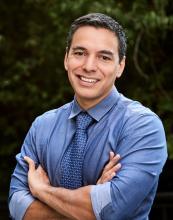
Carlos Ferreira, M.D.
Eunice Kennedy Shriver National Institute of Child Health and Human Development (NICHD)
Dr. Carlos Ferreira was born and raised in Paraguay. He went to medical school at the National University of Asunción, completed an internal medicine residency at Rush University Medical Center in Chicago, a clinical genetics fellowship at the National Human Genome Research Institute (NHGRI) and Johns Hopkins Hospital Medical Genetics consortium, and a subspecialty in medical biochemical genetics at NHGRI. After working as an attending physician in the Division of Genetics and Metabolism at Children's National Medical Center, in 2019 he was appointed to the Physician-Scientist Development Program at NHGRI. In 2024, he became a tenure-track investigator at NICHD, where he leads the Skeletal Genomics Unit, focusing on disorders of phosphate biology and skeletal disorders of unknown molecular origin. His research program aims to elucidate the phenotypic spectrum and genomic basis of selected skeletal dysplasias to understand the pathways and molecular mechanisms responsible for abnormal skeletal phenotypes by developing cell and animal models and to establish novel targeted therapeutic approaches for rare genetic skeletal disorders.
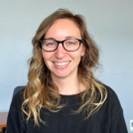
Allison Herman, Ph.D.
National Institute on Aging (NIA)
Dr. Allison Herman earned her B.S. in biology from La Salle University and her master’s degree in biology from Villanova University. She completed her Ph.D. in molecular and cellular biosciences at the Lewis Katz School of Medicine at Temple University. Her doctoral research focused on the mechanisms by which RNA-binding proteins regulate inflammation in vascular diseases. She was a postdoctoral fellow at NIA, where continuing her exploration of RNA biology she identified a novel senescence-regulatory miRNA and developed models of vascular cell senescence and aging. She became NIA’s first Independent Research Scholar, leading the Translational Senescence Unit in the Laboratory of Genetics and Genomics. In 2024, she became a Stadtman tenure-track investigator, heading the Vascular Aging Biology Unit in the Laboratory of Cardiovascular Science. Her research focuses on how modulating senescent cells in the vasculature can enhance the health span across all aging-affected tissues and organs.

Rasika Mathias, Sc.D.
National Institute of Allergy and Infectious Diseases (NIAID)
Dr. Rasika Mathias was born and raised in India. She received her B.S. in biology from Stella Maris College in India and an Sc.D. from Johns Hopkins Bloomberg School of Public Health and conducted postdoctoral research at the National Human Genome Research Institute. Dr. Mathias was a faculty member at Johns Hopkins University, where she held dual appointments as a professor in the Department of Medicine at the School of Medicine and Department of Epidemiology at the Bloomberg School of Public Health. In 2024, she joined the Laboratory of Allergic Diseases at NIAID as a Senior Investigator to establish the Genomics and Precision Health Section. Her research program interrogates big data to expand our knowledge in the biological and ultimately clinical basis of complex diseases based on interpretation of molecular intricacy and multi-omics variation. She is interested in translating insights at the molecular level to clinical practice through precision health initiatives leveraging genomics with an emphasis on accomplishing these goals in an equitable manner for all groups across diverse health systems.
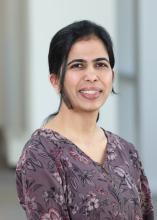
Amreen Mughal, Ph.D.
National Institute of Neurological Disorders and Stroke (NINDS)
Dr. Amreen Mughal was born and raised in India. She obtained her bachelor’s and master’s degrees in pharmacy from India. In 2013, she came to the U.S. to pursue her Ph.D. in pharmaceutical sciences from North Dakota State University. She conducted postdoctoral research at the University of Vermont, where she received an American Heart Association postdoctoral fellowship and a Career Development Award, and a National Institute on Aging K99 Pathway to Independence Award to study the vascular functional deficits in Alzheimer’s Disease. In 2024, she joined NIH as a Stadtman tenure-track investigator and Chief of the Neurovascular Research Unit. She has her primary appointment in the Stroke Branch in NINDS and a joint appointment with the Translational Vascular Medicine Branch of the National Heart, Lung, and Blood Institute. Her research unit studies the neurovascular coupling in control of blood flow in the brain and clearance of metabolic by-products. Additionally, her research extends to studies of vascular cognitive impairment and dementia.
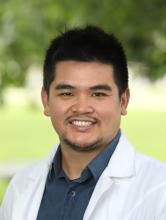
Joe Nguyen, D.D.S., Ph.D.
National Cancer Institute, Center for Cancer Research (NCI CCR)
Dr. Joe T. Nguyen earned his B.S. at the University of California, Davis, then pursued his D.D.S. and Ph.D. at the University of Michigan School of Dentistry. Following a Cancer Research Training Award Postdoctoral Fellowship at NCI, he became a Dental Clinical Research Fellow and then a Chief Clinical Research Fellow at the National Institute of Dental and Craniofacial Research. In 2024, he was appointed as a Physician-Scientist Early Investigator at NCI CCR, where his research integrates gene editing technologies and spatial multi-omics to elucidate the complexities of pre-malignant oral lesions driven by individual patient profiles. His goal is not only to develop targeted therapies but also to personalize treatments based on the unique genetic and molecular landscape of each patient's genetic lesions. By harnessing the power of cutting-edge technologies, Dr. Nguyen hopes to pioneer a transformative approach to oral cancer research.

Camila Odio, M.D.
National Institute of Allergy and Infectious Diseases (NIAID)
Dr. Camila Odio grew up in Columbus, Ohio, and spent summers visiting her family in Puerto Rico and Costa Rica. She earned her B.A. in molecular biology from Kenyon College and her M.D. from the Cleveland Clinic Lerner College of Medicine. She completed her internal medicine residency at Yale University School of Medicine and fellowship in infectious diseases at NIAID, where she is an Assistant Clinical Investigator. Her research leverages vaccine and cohort studies to explore the drivers of severe dengue and potential for novel therapeutics. This work includes launching a vaccine trial to model primary, secondary, and tertiary dengue, international collaborations examining immune responses to natural dengue infection, and designing clinical trials evaluating immunomodulators as dengue therapies.

Indira C. Turney, Ph.D.
National Institute on Aging (NIA)
Dr. Indira C. Turney was born and raised in Dominica and later relocated to St. Croix, U.S. Virgin Islands. She earned her bachelor’s degree in psychology from the University of the Virgin Islands and her Ph.D. in cognitive neuroscience from Pennsylvania State University. After postdoctoral training at Columbia University Irving Medical Center in New York City, she joined NIA’s Laboratory of Epidemiology and Population Sciences, Health Disparities Research Section, as an Earl Stadtman tenure-track investigator and an NIH Distinguished Scholar. As the director of the Brain Health Equity Unit, Dr. Turney uses advanced neuroimaging techniques, including magnetic resonance imaging and comprehensive epidemiologic and genomic analyses to investigate how environmental, sociocultural, and biological factors impact brain health, with a focus on diverse Black adults. Her research aims to advance health equity and address disparities in brain aging and dementia.

